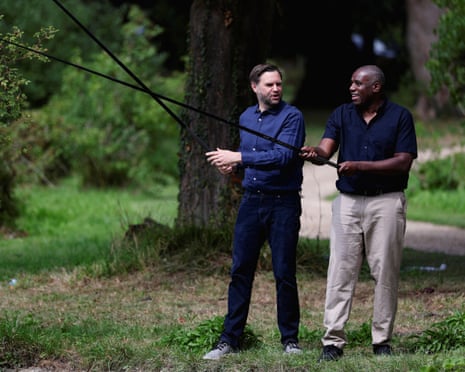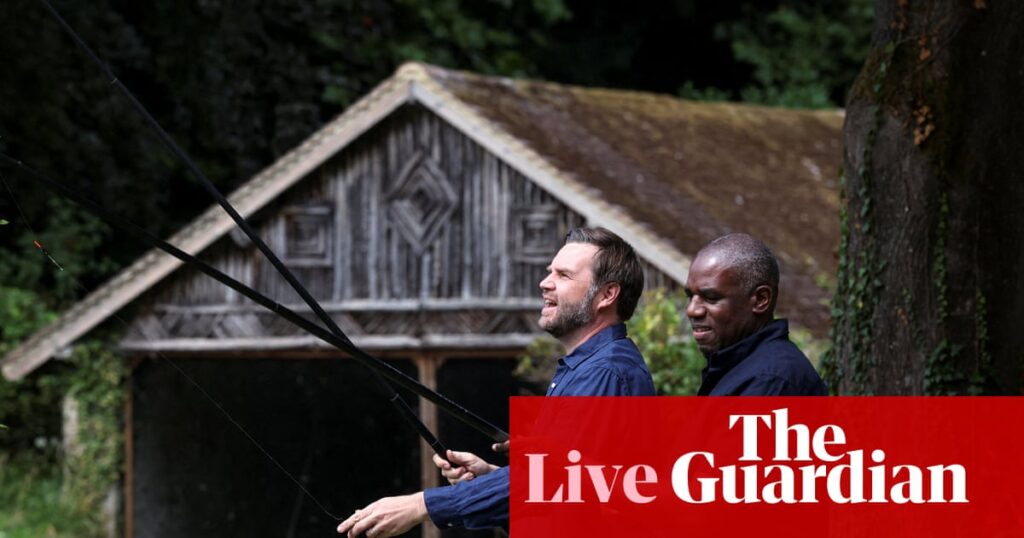David Lammy refers himself to watchdog for fishing with JD Vance without a licence
David Lammy has referred himself to the environment watchdog because he did not have a rod licence to go fishing with JD Vance.
The foreign secretary failed to catch any fish when he hosted the US vice-president at his grace-and-favour retreat at Chevening House, Kent.
Anglers in England and Wales aged 13 or over must have a rod licence to fish for freshwater species, such as carp, according to the Environment Agency.

“The foreign secretary has written to the Environment Agency over an administrative oversight that meant the appropriate licences had not been acquired for fishing on a private lake as part of a diplomatic engagement at Chevening House last week,” a Foreign Office spokesperson said.
“As soon as the foreign secretary was made aware of the administrative error, he successfully purchased the relevant rod fishing licences.
“He also wrote to the Environment Agency notifying them of the error, demonstrating how it would be rectified, and thanking them for their work protecting Britain’s fisheries.”
Key events

Jakub Krupa
The UK readout from the European leaders’ call issued by Keir Starmer’s spokesperson stressed the “unwavering” support for Ukraine as the leaders “agreed this week marks an important moment for the future of Ukraine,” and thanked US president Donald Trump “for his efforts in bringing Putin to the table in pursuit of a ceasefire to end to the ongoing bloodshed.”
The statement added:
“The prime minister was clear that our support for Ukraine is unwavering – international borders must not be changed by force and Ukraine must have robust and credible security guarantees to defend its territorial integrity as part of any deal.
“Europe stands ready to support this and will continue to work alongside president Trump and President Zelenskyy for a just and lasting peace in Ukraine …”
It noted that the leaders would speak again after Friday.
Britain’s data protection watchdog has warned facial recognition does not operate in a “legal vacuum” and police must use it with “appropriate safeguards”, as it prepares to share findings from an audit of two Welsh forces.
A spokesperson for the Information Commissioner’s Office said: “Facial Recognition Technology (FRT) does not operate in a legal vacuum.
“It is covered by data protection law, which requires any use of personal data, including biometric data, to be lawful, fair and proportionate.
“When used by the police, FRT must be deployed in a way that respects people’s rights and freedoms, with appropriate safeguards in place.
“FRT is a priority for the ICO due to its potential benefits and risks.
“We play an important role ensuring police are compliant with data protection law and that people’s rights are protected, including by providing clear guidance on the use of FRT and undertaking regular audits of police forces, so that the public can have confidence in how the technology is used.
“We have recently concluded our audit of South Wales Police and Gwent Police and will be sharing our findings shortly.”

Haroon Siddique
The next mass protest in support of the banned group Palestine Action will aim to be twice the size of the last, organisers have said, as they increase pressure on the government to lift its proscription.
Last Saturday’s protest in Parliament Square was predicated on 500 people signing up but the next one, announced on Wednesday for 6 September, is conditional on 1,000 people agreeing to take part.
Defend Our Juries, the pressure group behind the protests opposing the proscription of Palestine Action, said it believed a turnout of 1,000 would be enough to get the ban lifted.
A total of 532 people were arrested at Saturday’s demonstration, all but 10 under section 13 of the Terrorism Act for carrying placards saying: “I oppose genocide, I support Palestine Action.”
The number of people arrested for peaceful protests, their age profile – half of those arrested were 60 or older – and the strain it is putting on the criminal justice system have led many to question the ban.
A Defend Our Juries spokesperson said:
With all the real challenges facing the country, it’s crazy that the Labour government has generated a political crisis over people quietly holding cardboard signs against genocide in Parliament Square. This won’t be forgotten.

Jessica Murray
The vitriol faced by scouts and charity rowers mistaken for migrants was not an “innocent mistake”, a race equality campaigner has said, as she warned that toxic rhetoric could lead to more vigilantism and violence.
A wave of anti-migrant protests outside asylum hotels in recent weeks has been followed by growing reports of vigilantism, with people facing abuse after being mistaken for migrants.
Police have launched an investigation into an incident at a scout camp in Wales, where children were allegedly filmed and subjected to racial abuse amid unfounded speculation the site was being used to house immigrants.
Last week, Great Yarmouth MP Rupert Lowe – formerly of Reform UK, now an independent – was accused of being part of a vigilante effort after he reported a charity rowing crew he mistakenly thought were possible “illegal migrants”.
“We’re in a really dangerous situation and the government really needs to step up to the challenge,” said Dr Shabna Begum, the chief executive of the Runnymede Trust.
We’re in quite a desperate place of despair and gloom, and that breeds the division and type of activity that we’re seeing.
We are looking at a really bleak future where, if the government doesn’t address some of the deep-seated inequalities in the country, we are likely to see more of these vigilante groups, which just breed more violence.
Reports of a vigilante group in Bournemouth have been met with alarm. More than 200 residents have supposedly signed up to Safeguard Force, which claims it will carry out uniformed patrols in the seaside town to protect “women, children and the elderly”.
Begum said this type of behaviour had been triggered by a “breakdown of the social contract” and a failure of politicians to deal with economic deprivation.
Keir Starmer has spoken with his Dutch counterpart Dick Schoof and agreed “there should be no decisions about the future of Ukraine without Ukraine” in a call on Wednesday, Downing Street said.
A Number 10 spokesperson said:
The prime minister spoke to the prime minister of the Netherlands Dick Schoof earlier today.
They discussed their sustained support for Ukraine and the ongoing work to end Russia’s barbaric war. They agreed that there should be no decisions about the future of Ukraine without Ukraine.
They looked forward to discussing further in this afternoon’s meetings alongside President Trump and President Zelensky.

Robert Booth
It was a celebratory multimillion pound scheme to mark the beginning of King Charles III’s reign. Free portraits of the king were offered to all public bodies – every town hall, university, hospital and even jobcentre – so the new monarch’s visage could gaze down on his subjects.
The initiative would provide “a reminder of the example set by our ultimate public servant”, said the then Tory deputy prime minister, Oliver Dowden.
But the current government is proving coy about where exactly any of the images of King Charles ended up after it admitted more than 46,000 public institutions had showed no interest. In what has been described as an “absurd” decision about a scheme to distribute large portraits of the king to be hung in public view, it is refusing to say which schools, hospitals and job centres did request them, saying it could “give rise to controversy” and create “negative public perception”.
More than £2.7m was spent meeting requests for the pictures and while take-up was patchy, more than 20,000 images of Charles in a medal-laden Royal Navy uniform were sent out – a 31% hit rate.
But the reluctance to reveal where they ended up has emerged from a Guardian freedom of information request which the Cabinet Office has been resisting for many months. Last October it rejected the request for the information by arguing disclosure would be an “actionable breach of confidence”. In effect it implied a public authority which requested a portrait of the king to display in public might sue the government for revealing that it had done so.
When the Guardian appealed on the grounds that “requesting a portrait of the king funded by the taxpayer for the express purpose of being publicly displayed cannot reasonably be considered a confidential matter”, it dropped that justification and changed tack to claim release would “prejudice the effective conduct of public affairs”, a different exemption under the Freedom of Information Act.
It said disclosure “would be likely to trigger questions about why certain organisations requested the portrait and (by extension) why others did not” and that organisations would be distracted from operational activity by having to answer them.
The Treasury is looking at ways to increase the money it collects through inheritance tax (IHT), sources have told the Guardian.
Ideas on the table include a review of the rules on giving away assets, with one possibility being the introduction of a lifetime cap on how much an individual can donate.
Any changes would come on top of other moves the government has already made to close IHT loopholes. The Guardian’s money and consumer editor, Hilary Osborne, has written this explainer on how IHT works and what might be changing:
Labour to revive Northern Powerhouse Rail project

Josh Halliday
Keir Starmer is to formally revive Northern Powerhouse rail this autumn with an announcement expected before the Labour conference, as a major demonstration of Labour’s commitment to northern infrastructure.
Sources said the speech would be delivered by both Starmer and Rachel Reeves as they attempt to show their commitment to Labour’s former heartlands across the north of England, where Nigel Farage’s Reform UK is eyeing significant gains at the next general election.
Government advisers are planning to time the announcement before Labour conference on 28 September, with the aim of boosting the morale of backbenchers after a series of damaging U-turns.
The transport secretary, Heidi Alexander, is expected to make the rail project a key theme of her conference speech. A government source said the announcement was likely to take place before then but that the timing was not yet confirmed.
Political and industry figures in the north of England have urged Starmer for over a year to revive the Manchester leg of HS2 and to build Northern Powerhouse Rail (NPR), an east-west connection linking Liverpool to Hull.
NPR is seen by some as critical to rebalancing the UK’s economy as it would connect potentially five of Britain’s major cities – including Leeds, Bradford and Sheffield – on a route that for decades has been choked by trundling old trains and the overloaded M62. A DfT source said the exact route had not yet been formally agreed.
The NPR plan requires part of the HS2 construction between Crewe and Manchester to go ahead, also raising hopes that ministers would also commit to some form of HS2 running to Birmingham and London.
David Lammy refers himself to watchdog for fishing with JD Vance without a licence
David Lammy has referred himself to the environment watchdog because he did not have a rod licence to go fishing with JD Vance.
The foreign secretary failed to catch any fish when he hosted the US vice-president at his grace-and-favour retreat at Chevening House, Kent.
Anglers in England and Wales aged 13 or over must have a rod licence to fish for freshwater species, such as carp, according to the Environment Agency.
“The foreign secretary has written to the Environment Agency over an administrative oversight that meant the appropriate licences had not been acquired for fishing on a private lake as part of a diplomatic engagement at Chevening House last week,” a Foreign Office spokesperson said.
“As soon as the foreign secretary was made aware of the administrative error, he successfully purchased the relevant rod fishing licences.
“He also wrote to the Environment Agency notifying them of the error, demonstrating how it would be rectified, and thanking them for their work protecting Britain’s fisheries.”
Brexit and immigration restrictions damaging Scottish economy, says minister

Severin Carrell
Scotland would have a stronger economy and would be richer if the UK government allowed greater immigration and rejoined the EU, Shona Robison, the Scottish finance secretary said after the country’s fiscal deficit grew.
Robison said the growing deficit, which reached £26.5bn or 11.4% of Scotland’s GDP in 2024/25, was partly attributable to the economic damage caused by Brexit and the impacts of strict immigration controls on Scotland’s population.
Speaking to reporters in Edinburgh after the new economic data was published, Robison said:
The UK government’s current approach to the economy does not benefit Scotland.
Its approach to immigration, for example, harms Scotland by failing to address our demographic and economic needs, and it’s failing to deliver the investment needed, with our capital budget set to fall in real terms over the coming years. And that’s before we go into the effects of Brexit, which is estimated to have reduced our revenue by £2.3 billion.
Both those policies would be reversed if Scotland were independent, Robison said. She claimed the positive effects of independence would kick in on “day one”. It would, however, take some years for Scotland to rejoin the EU, and to unpick all Scotland’s complex links with the UK.
Most economists, including those used previously by the Scottish National party government, predict an independent government would need to make swingeing spending cuts or significantly raise taxes in order to close the fiscal gap.
The new government expenditure and revenue Scotland (GERS) report for 2024/25 said that overall, the UK and Scottish governments raised £91.4bn in taxes in Scotland but spent £117.6bn – a figure which includes Scotland’s notional share of spending in other parts of the UK or overseas in areas such as defence, trade and foreign affairs.
Robison also acknowledged Scotland had to rely much less on North Sea oil and gas revenues, which were rapidly dwindling, if it became independent. GERS said that excluding oil revenues in 2024/25, Scotland’s notional fiscal deficit rose to £30.6bn, or 14.45 of GDP – far higher than the EU would accept if Scotland tried to become a member.

Libby Brooks
The former judge leading the public inquiry into the death of a black man in custody has refused to step down after the Scottish Police Federation and Scotland’s solicitor general accused him of bias.
Responding to Lord Bracadale’s decision to remain in post, the lawyer for the family of Sheku Bayoh, who died in Kirkcaldy in 2015 after he was forcibly restrained by officers, in turn accused the federation of “a deliberate and cynical attempt to evade scrutiny”.
Aamer Anwar, who has represented the Bayoh family for a decade, also said that the position of Ruth Charteris, the solicitor general who made the unprecedented intervention, was “untenable”.
Charteris and the federation had argued that Bracadale unfairly held private meetings with the Bayoh family, which indicated “apparent bias”, a claim that would have significant ramifications for other UK public inquiries if it had been accepted.
But, after a hearing that cost the taxpayer £2m, he concluded that the meetings were “private but not secret” and did not breach the right of other participants in the inquiry to be heard.
Keir Starmer pays tribute to Welsh Labour politician Hefin David after sudden death
Prime minister Keir Starmer has paid tribute to Welsh Labour politician Hefin David, describing him as a “powerful voice for the people of Wales and a committed public servant”.
Backbench politician David died suddenly, the first minister of Wales confirmed on Wednesday shortly before midday. Eluned Morgan, the Welsh Labour leader, paid tribute to the Caerphilly MS, who has been a member of the Welsh parliament since 2016.
In a statement after David’s death, Starmer said:
The entire Labour movement will join me in grieving the loss of Hefin David.
He was a powerful voice for the people of Wales and a committed public servant, who dedicated his life to making sure every person and community in Wales had the opportunities and support they deserve.
As Member of the Senedd for Caerphilly, where he was born and lived, he was incredibly proud of his community.
Our hearts are with his family and those who knew and loved him at this painful time. May he rest in peace.
According to the PA news agency, a Gwent police spokesperson said:
We were called to a report of a medical emergency at an address in Nelson at around 6.55pm on Tuesday August 12. Officers attended and after entering the property found a 47-year-old man unresponsive inside.
Paramedics from the Welsh ambulance service also attended and confirmed that the man had died; his family are aware and receiving support.
The death is not viewed as suspicious, and a report will be submitted to the coroner in relation to the death.
Starmer joins diplomatic push ahead of Trump-Putin summit

Jakub Krupa
Keir Starmer will be among European leaders who will speak with the US president, Donald Trump, and his vice-president, JD Vance, today, consulting ahead of this Friday’s summit with Russian president Vladimir Putin.
Representing Team Europe are the host, the German chancellor, Friedrich Merz, the Finnish president, Alexander Stubb, the French president, Emmanuel Macron, the Italian prime minister, Giorgia Meloni, the Polish prime minister Donald Tusk, and Starmer.
They will be joined by the European Commission president, Ursula von der Leyen, and the European Council president, António Costa, and that famous Trump-whisperer, the Nato secretary general, Mark Rutte.
They will be also joined by the Ukrainian president, Volodymyr Zelenskyy, who in a further show of unity with his partners will not only be on the call, but will be joining the host in person in Berlin.
You can follow Jakub Krupa’s updates on this in the Guardian’s Europe live blog:
Yvette Cooper insisted there would be “safeguards and protections” governing the use of live facial recognition as she was questioned about whether its deployment could infringe on privacy.
The PA news agency reports that when Cooper was asked whether the rollout was an infringement on people’s privacy, the home secretary said:
Well, the way this technology is being used is to identify people who are wanted by the court, who maybe should be returned to prison, or who have failed to appear before the court, or who have breached things like sexual harm prevention orders, so serious criminals.
And I think being able to identify them, alongside having proper legal safeguards and a legal framework in place because there do have to be safeguards and protections, but we also need to be able to use the technology to catch dangerous criminals and to keep communities safe.
Home secretary says guidance for police on sharing suspects’ ethnicity and nationality is a ‘step forward’
The home secretary has welcomed guidance for the police that has told them to share suspects’ ethnicity and nationality with the public, reports the PA news agency.
Yvette Cooper said the government had been clearer for the need for more openness. It comes after authorities were accused of covering up offences carried out by asylum seekers, and in the wake of riots after the Southport murders which were partly fuelled by social media disinformation.
Cooper said:
We welcome the guidance because this is a step forward, and we have been clear that we need greater transparency and that’s what the public want to see.
But we have also asked the Law Commission, particularly to look at what information can be released to make sure that we’re not also affecting criminal trials that are under way.
That’s where a lot of the restrictions and constraints have been. So we’ve asked the Law Commission to report, very quickly, this autumn on what more can be done to avoid prejudicing criminal trials.
NGOs urge Nandy to halt sale of Telegraph over China links

Mark Sweney
A group of nine human rights and freedom of expression organisations have called on the culture secretary to halt RedBird Capital’s proposed £500m takeover of the Telegraph and investigate the US private equity company’s ties to China.
The international non-governmental organisations, which include Index on Censorship, Reporters Without Borders and Article 19, have written to Lisa Nandy arguing that RedBird Capital’s links with China “threaten media pluralism, transparency and information integrity in the UK”.
A consortium led by RedBird Capital agreed a deal in May to buy the Daily Telegraph and Sunday Telegraph, ending two years of uncertainty over the future of the titles.
The organisations said that RedBird Capital’s chair, John Thornton, sits on the advisory council of the China Investment Corporation, the country’s largest sovereign wealth fund.
Thornton, a former chair of Goldman Sachs Asia, has also previously chaired the Silk Road Finance Corporation.
“Both [are] vehicles through which China has pursued financial influence,” the letter said.
The signatories, who also include Hong Kong Watch, Human Rights in China and the Hong Kong Democracy Council, said Nandy should follow her predecessor, Lucy Frazer, who issued a public interest intervention notice (PIIN) in January last year.

